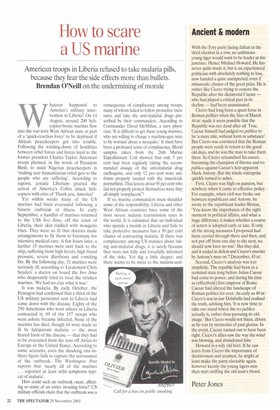Ancient & modern
With the Tory party facing defeat at the third election in a row, no ambitious young tiger would want to be leader at this juncture. Hence Michael Howard. He has never quite made it, but is an experienced politician with absolutely nothing to lose, now handed a quite unexpected, even if minuscule, chance of the great prize. He is rather like Cicero trying to restore the Republic after the dictatorial Caesar — who had played a critical part in its decline — had been assassinated.
Cicero had long been a spent force in Roman politics when the Ides of March 44 BC made it seem possible that the Republic was not dead after all. True, Caesar himself had judged res publica to be 'a mere title, without form or substance'. But Cicero was convinced that the Roman people were ready to return to the good old days, and he was the man to take them there. So Cicero relaunched his career, becoming the champion of libertas and res publica against Caesar's heir-apparent Mark Antony. But the whole enterprise quickly turned to ashes.
First, Cicero was high on passion, but nowhere when it came to effective policy. For example, when civil war broke out between republicans and Antony, he wrote to the republican leader Brutus, 'You know the importance of the right moment in political affairs, and what a huge difference it makes whether a course of action is adopted early or late. If only all the strong measures I proposed had been carried through there and then, and not put off from one day to the next, we should now have no war.' But they did, and it ended in defeat and Cicero's murder by Antony's men on 7 December, 43 BC.
Second, Cicero's analysis was too simplistic. The republic had been in a terminal state long before Julius Caesar had come to power, and during his time as (effectively) first emperor of Rome Caesar had altered the landscape of Roman politics for ever. As early as 48 BC Cicero's son-in-law Dolabella had realised the truth, advising him, 'It is now time to take our stand where the res publica actually is, rather than pursuing its old image.' But Cicero would not listen, driven as he was by memories of past glories. In the event, Caesar turned out to have been right. Cicero's allies saw the way the wind was blowing, and abandoned him.
Howard is a wily old bird. If he can learn from Cicero the importance of decisiveness and acumen, he might at least make the party electable again, however keenly the young tigers may then start sniffing the old man's blood.
Peter Jones


























































































 Previous page
Previous page